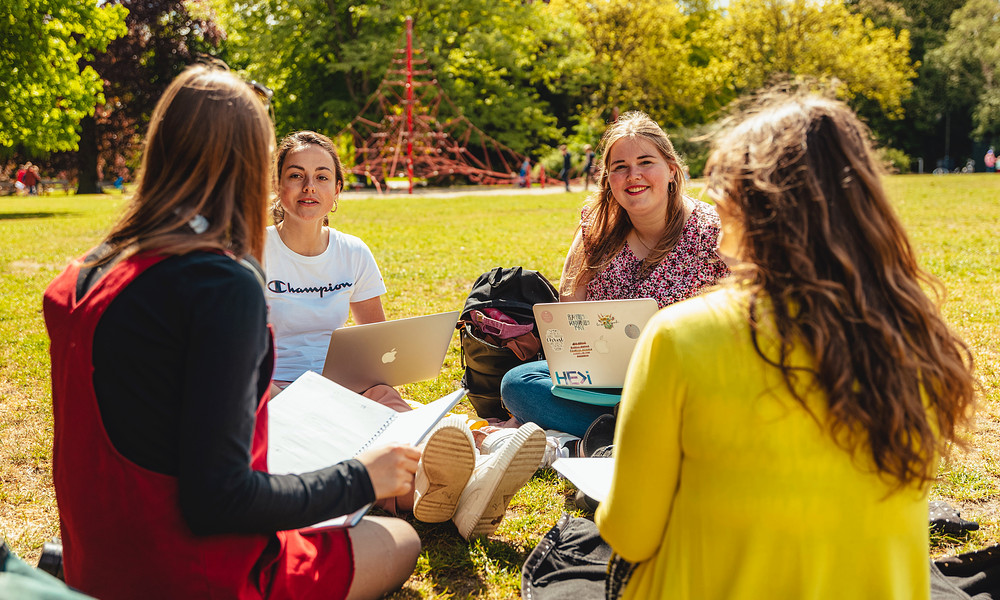
As a university of applied sciences, we contribute to the Sustainable Development Goals (SDGs), based on our social commitment.
In our Ambition 2030, we have expressed this commitment and in our strategic plan, we have translated it into our four social missions. A few years ago, we actually started to give shape to that ambition with a concrete programme focused on sustainability and thus the SDGs. In the coming years, this programme will be incorporated into the social tasks as formulated in our strategic policy plan 2021-2026.
We will do this through innovative combinations of our research and education, with a focus on four social tasks relevant to the Northern Netherlands:
- energy & circular
- healthy & active
- sustainable & liveable
- digital & connected
Read more about it on Our Strategy.
Sustainable Development Goals
In 2018, we embraced the Sustainable Development Goals (SDGs). Our university of applied sciences was one of the first universities of applied sciences to sign the SDG charter of SDG Netherlands. All universities of applied sciences have now done so. The schools are united in a network that consists of the Association of Universities of Applied Sciences and SDG Netherlands. This coalition is taking joint steps to ensure that higher education contributes to the SDGs.
In 2019, all organisational units of our university of applied sciences included the SDGs in their annual plans and in 2021 the SDGs were also anchored in the strategic policy plan. Our university of applied sciences is committed to sustainability along three tracks: organisation, research and education. We see it as our mission to set an example in the field of sustainability. An important benchmark in this is the start of the GreenQuest and the start of the Green Team.
GreenQuest
In recent years, we have fulfilled the exemplary role we aspire to in the field of sustainability. We were the first educational institution in the Netherlands to start GreenQuest, which is a search for green innovations to help make the Netherlands more sustainable. We have formulated four objectives for the period up to 2025.
1. Hanze is cutting off the gas supply
The Hanze Aardgaslos action plan is on schedule. This means that our university of applied sciences will be natural gas-free by 2025. In 2022, the new construction of the Van OlstBorg was completed, which also made it possible to turn off the gas tap at this building.
The government has made a multi-year agreement with a large number of sectors on improving energy efficiency. From January 2022, we tested the energy consumption signalling report in two of our buildings. This report ensures that monthly action can be taken in the event of significantly deviating energy consumption in a building.
2. Hanze will become a zero waste institution
Hanze now produces more than 400,000 kilos of waste per year, 68 percent of which consists of residual waste. 70 percent of the residual waste is recyclable, provided it is collected separately. We can improve even further in this area. In 2022, there was a new tender for the separate collection of waste.
3. Hanze creates role models
We encourage our employees to become sustainable role models. As a result, in more and more places, policy and our intrinsically motivated colleagues reinforce each other, which produces sustainable results. The idea of these role models is that they set a good example and enthuse their students. Hanze also supports the idea that teachers are important ambassadors in the field of sustainability. With the help of EduSTA, for example, teachers can receive a Digital Open Badge after attending workshops in the context of the SDGs, so that they internalise them and can act as inspiring examples and role models for students.
4. Every student a sustainable ambassador
We encourage students and staff to develop themselves: as professionals, but also as people who feel responsible for the world around them. In the Green Ambassador Programme, schools, together with the support services, Centres of Expertise and knowledge centres, work on a university of applied sciences that inspires students to use their talents for a better world. As sustainable ambassadors, our students are able to apply the goals in their chosen field and to propagate them in their professional life. Last year, we saw an exponential growth in the number of green ambassadors to more than 1,900. This was almost double the total of the first four years.
The goal is to implement the Green Ambassador Programme in the curriculum of an increasing number of study programmes, so that more and more students are trained sustainably. In addition, we are involved in several SDG challenges to encourage students to think sustainably. Examples are the SDG Challenge, the Clothing Factory of the Future and the SDG Action Day.
Green HUB en Green Team
In the Green HUB, role models and ambassadors become visible to and are able to connect with one another. The Green HUB has a large network within and outside our university of applied sciences and works closely with the Green Team. This is a team of enthusiastic colleagues from all parts of the organisation, who drive sustainability within our university of applied sciences. They inspire, advise and connect colleagues, projects and policy development.
Feedback component
How satisfied are you with the information on this page?